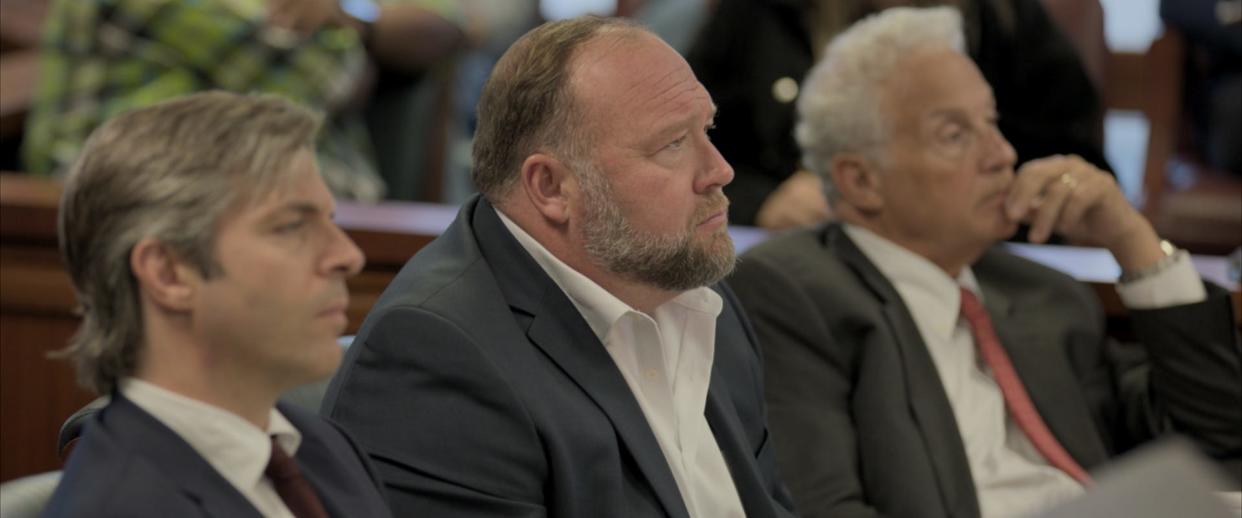How 'The Truth vs. Alex Jones' brings up tragic American questions

It took no small amount of gumption for me to finally watch the new HBO documentary “The Truth vs. Alex Jones.”
I was expecting a hate-watch. You know, like people who consume cable news just because it feeds into existing anger about a topic and amplifies that emotion. Like a drug, something I try to avoid because there’s plenty to be angry about and I don’t need excuses.
But there’s something wholly necessary about this story and what it says, not only about conspiracy theorist broadcaster Alex Jones but also about his audience and the state of American culture. One should learn something if your blood pressure is going to rise so precipitously.
For those of you lucky enough not to know, Jones is an Austin, Texas-based web personality who runs InfoWars. His media domain peddles wild theories about the events of the day in between selling iodine droplets and dietary supplements.
Conspiracies have been around forever as the laziest way of connecting data points, as Nate Silver once put it. But there’s something soothing to particular brains that see patterns in a world that doesn’t make sense and feels out of control. Perhaps there is some plan hatched by nefarious people of wealth and fortune who, in fact, are behind all the chaos. Maybe those forces are the reason one has not met their potential and been held down their entire lives, the brain thinks.
Yes, there must be someone else to blame. Oh and I had better buy this prepper kit for only $39.99 plus shipping while I am at it.
Jones has amplified his messaging at a rate to where millions of people believe what he says and hang on every word. So when a lone gunman walked into Sandy Hook Elementary School in December 2012 and killed 26 people, Jones saw an opportunity where others saw a tragedy.
He called the incident a “false flag” and said it was “made up” by whomever wanted to come in and take your guns. Before this film, I knew few details of the actual brutality that happened in that school on that day. Documentarian Dan Reed lays it out in cold, clinical detail, making it impossible to forget.
Almost immediately, Jones and his circus of freaks began to suggest the grieving parents were faking it. Actors employed as part of the gun-grabbing scheme. The children are still alive.
InfoWars spends the next several years hounding these parents and members of the community, accusing them of plotting. If I hated Jones already for exploiting the weak minds of his audience, I was cursing him to hell as the film spooled along.
Several parents, tired of being pelted with threats while they attempt to mourn the death of their children in the worst way possible, take the matter to court. Defamation and intentional infliction of emotional distress are their claims. Jones and his legal team are so dishonest in the discovery process a default judgment is entered against them. Which leaves the jury only to consider monetary damages.
While the film has to go into great detail about Jones’ history and Sandy Hook, you can forgive it for skimping on some details of how all of this works legally.
The families confront Jones in court, and he is as bombastic and confounding as you can imagine. Watching the judges and lawyers tear into him is satisfying. But even with the massive judgments against him, the families still must reconcile with their lost children. Not to mention the awards remain uncollected, and Jones is allowed to continue beaming out to the world while people order from his online store.
Which, philosophically, is the most interesting thing about “The Truth vs. Alex Jones.” At one point during the trial, a lawyer puts up a statistic that 24 percent of Americans believe Sandy Hook was a hoax. As two juries indirectly determined, Jones was liable for this assertion. But think about what this says about our country and how the Internet is able to manipulate so many people into believing a lie.
It is as though one in four of us want to believe in some sort of alternate reality. Where we want to believe there is no solution such as reasonable gun control, but rather a shadowy cabal who creates the illusion of mass murder in order to take your guns away.
Has our country always been like this — and has increased access to information made us aware of people who will believe anything, the more outrageous the better? Or has this increased information led to the infiltration of so much disinformation that many people cannot tell the difference and are simply persuaded by someone compelling? Maybe these people don’t want to know the difference?
These are questions I think about a lot, and they are well-illustrated by “The Truth vs. Alex Jones." Perhaps it was not anger I ended up feeling, but depression for a society that not only tolerates people like Jones but believes them. As much as you might dread it, the film is urgent viewing.
James Owen is the Tribune’s film columnist. In real life, he is a lawyer and executive director of energy policy group Renew Missouri. A graduate of Drury University and the University of Kansas, he created Filmsnobs.com, where he co-hosts a podcast. He enjoyed an extended stint as an on-air film critic for KY3, the NBC affiliate in Springfield, and now regularly guests on Columbia radio station KFRU.
This article originally appeared on Columbia Daily Tribune: How 'The Truth vs. Alex Jones' brings up tragic American questions
